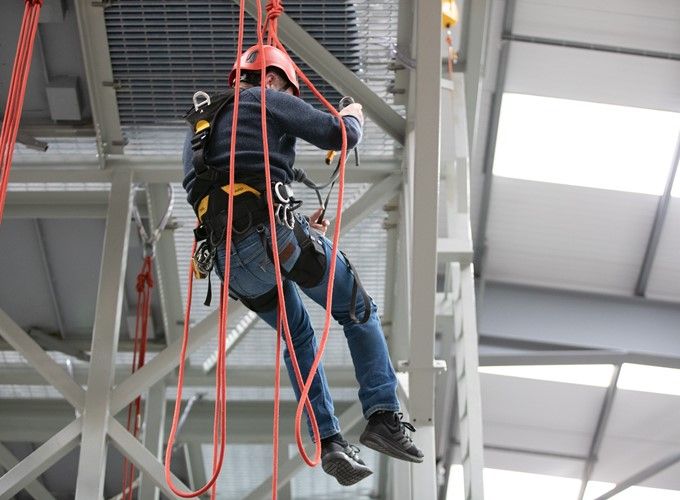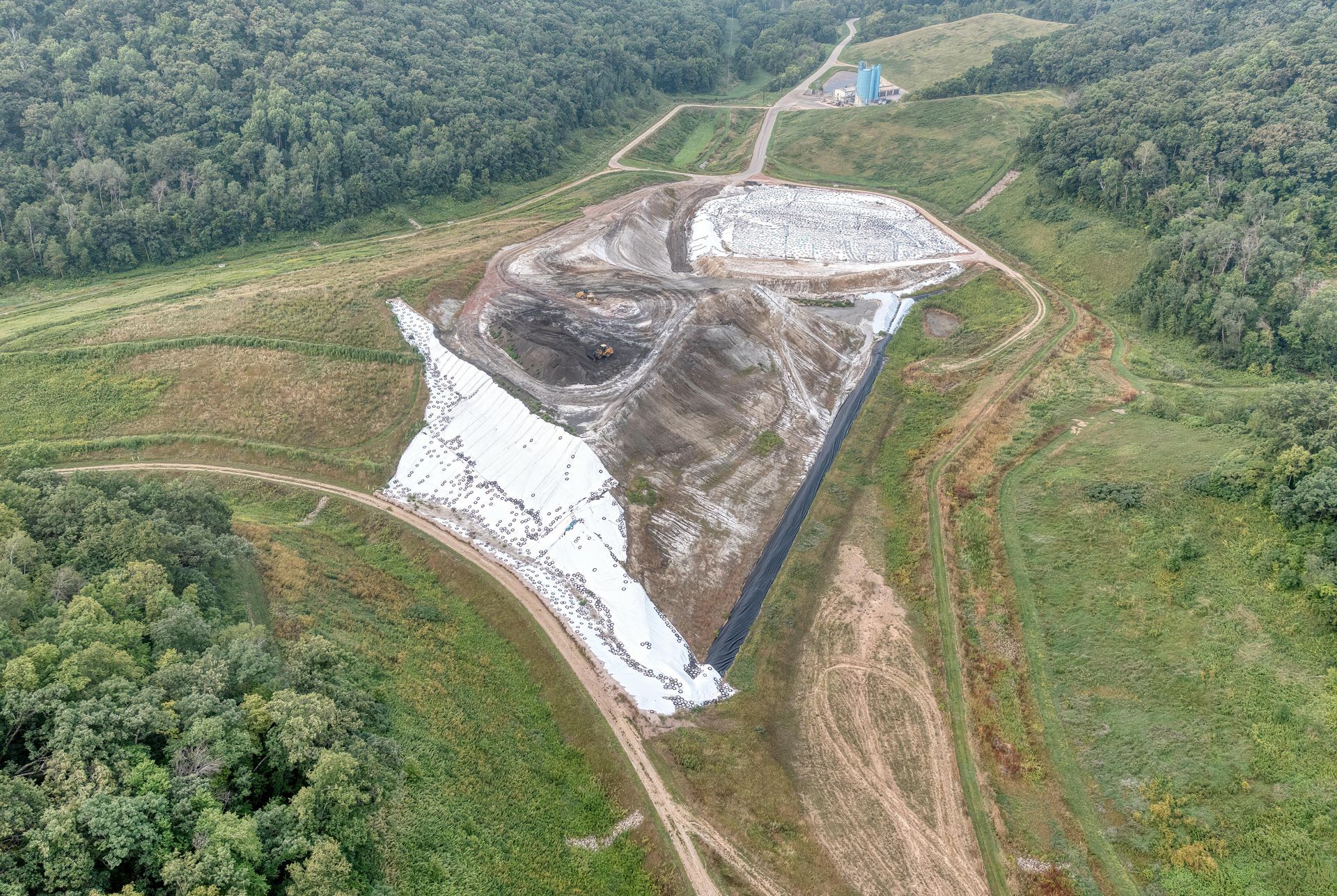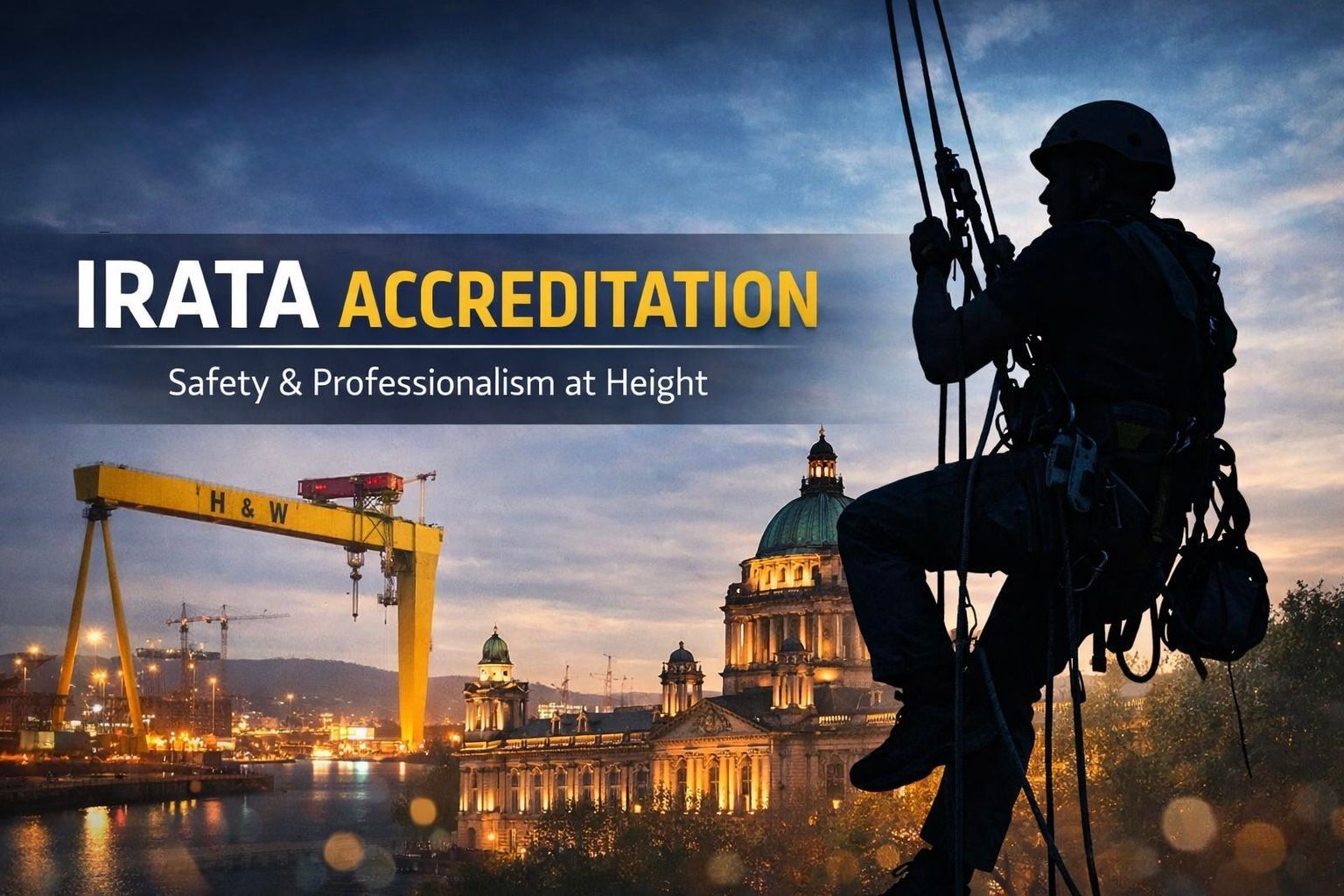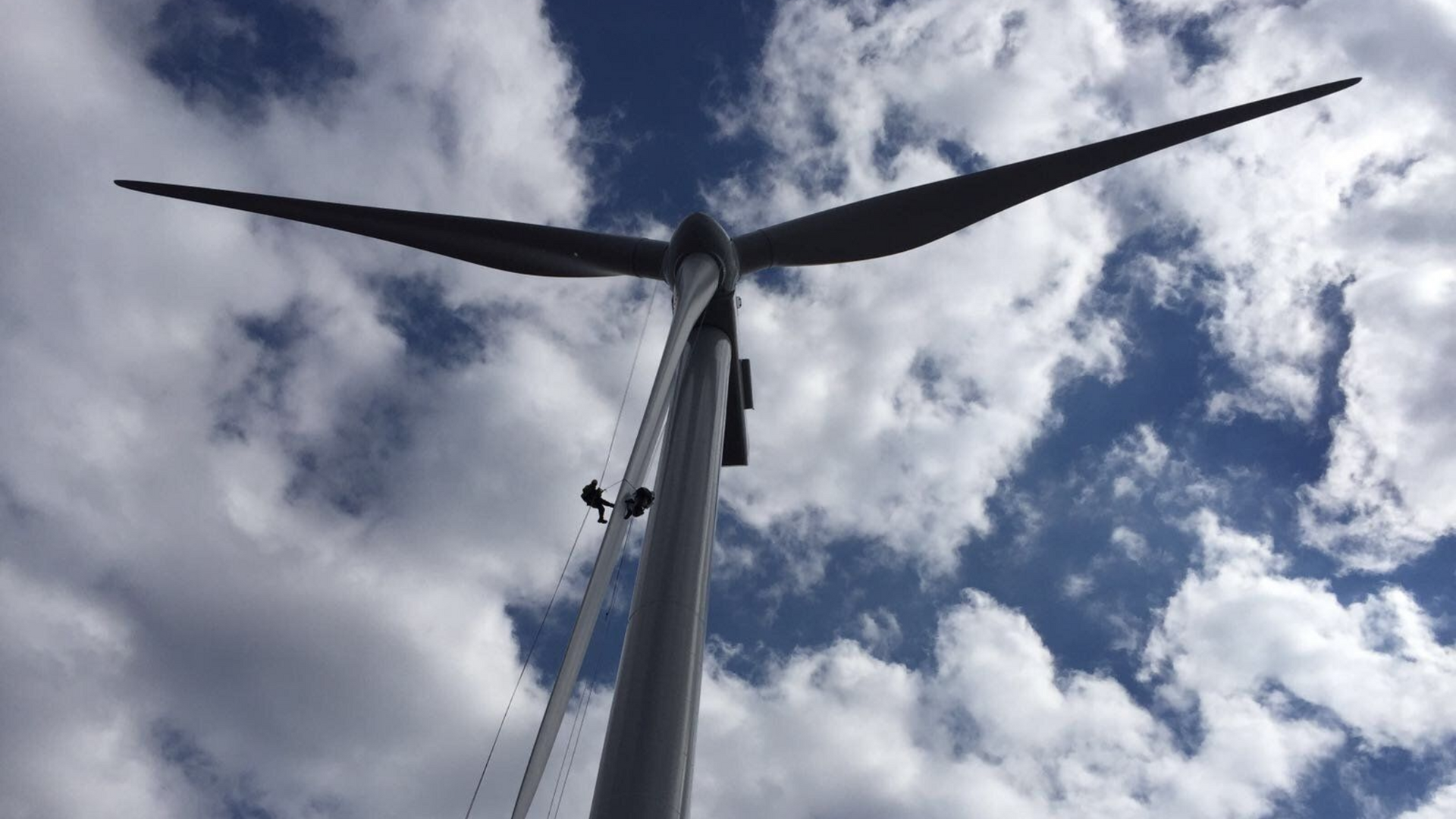Reach New Heights with Rope Access Training: Find the Best Courses Near You

Reach New Heights with Rope Access Training: Find the Best Courses Near You
Are you ready to take your career to new heights? If you have a passion for adventure and enjoy working in thrilling and challenging environments, then rope access training might be just what you need. With rope access techniques, you can access high and difficult-to-reach places with ease, making it a popular choice for industries such as construction, maintenance, and rescue operations. But where can you find the best rope access training courses near you? Look no further! In this article, we will explore the world of rope access training and guide you in finding the top-rated courses that will equip you with the skills and knowledge to excel in this exciting field. Whether you are a beginner looking to start your journey or a seasoned professional seeking to enhance your expertise, we have got you covered. Get ready to reach new heights and unlock a world of endless possibilities with rope access training.
What is Rope Access Training?
Rope access training is a specialised form of work positioning that allows workers to safely access and perform tasks at height or in confined spaces. This technique involves the use of ropes, harnesses, and specialised equipment to carry out various tasks, such as inspections, repairs, and installations. Unlike traditional methods like scaffolding or cranes, rope access offers greater flexibility, efficiency, and cost-effectiveness. It is widely used in industries such as construction, oil and gas, wind energy, telecommunications, and even in theatre and film production.
Rope access training courses provide participants with the necessary skills and knowledge to work safely and effectively at height. These courses typically cover a range of topics, including rope access equipment and techniques, safety procedures, rescue and emergency response, and relevant regulations and standards. By completing rope access training, individuals gain the confidence and competence to perform tasks at height with precision and utmost safety.
Rope access training courses are typically conducted by certified training organisations or institutes that adhere to international standards, such as the Industrial Rope Access Trade Association (IRATA) or the Society of Professional Rope Access Technicians (SPRAT). These organisation's ensure that training providers meet strict requirements in terms of instructor qualifications, course content, and assessment methods.
The Benefits of Rope Access Training
Rope access training offers numerous benefits for individuals and organisation's alike. Here are some of the key advantages:
1. **Safety**: Safety is paramount when working at height, and rope access training emphasises the importance of proper techniques, equipment usage, and risk assessment. By understanding and adhering to safety protocols, workers can minimise the risk of accidents and injuries.
2. **Versatility**: Rope access techniques can be used in a wide range of environments, including vertical structures, confined spaces, and even underwater. This versatility makes it a valuable skillset for various industries, allowing workers to access difficult-to-reach places with ease.
3. **Efficiency**: Compared to traditional methods like scaffolding or cranes, rope access is often faster and more cost-effective. It eliminates the need for extensive setup and dismantling, resulting in reduced downtime and increased productivity.
4. **Minimal Disruption**: Rope access techniques enable workers to carry out tasks with minimal disruption to the surrounding environment. This is particularly beneficial in sensitive areas where noise, vibration, or damage must be kept to a minimum.
5. **Environmental Impact**: Rope access has a smaller environmental footprint compared to traditional methods, as it requires fewer materials and machinery. This makes it a more sustainable choice for industries looking to reduce their carbon footprint.
6. **Career Advancement**: Obtaining rope access certification can open up new career opportunities and increase earning potential. With the demand for rope access technicians on the rise, individuals who possess these skills are in high demand in industries such as construction, oil and gas, and renewable energy.
Rope Access Training Statistics
Rope access training has gained significant popularity over the years, thanks to its effectiveness and versatility. According to industry statistics, here are some key figures that highlight the growing importance of rope access training:
1. The rope access market is projected to reach $1.1 billion by 2027, with a CAGR of 6.1% from 2020 to 2027.
2. The construction industry accounted for the largest share of the rope access market in 2020, owing to the need for inspections, maintenance, and repairs of high-rise structures.
3. Rope access is increasingly being used in the wind energy sector, with an estimated annual growth rate of 8.7% from 2021 to 2028.
4. The oil and gas industry also relies heavily on rope access techniques for maintenance and inspection of offshore installations, with a projected growth rate of 7.3% from 2021 to 2028.
These statistics demonstrate the growing demand for rope access training and the wide range of industries that benefit from this versatile working at height technique.
Industries That Use Rope Access Techniques
Rope access techniques are utilised in various industries that require work at height or in confined spaces. Some of the key sectors that rely on rope access include:
1. **Construction**: Rope access is commonly used in the construction industry for tasks such as facade inspections, concrete repairs, window cleaning, gutter cleaning roofing repairs and painting. It allows workers to access tall buildings and structures safely and efficiently.
2. **Oil and Gas**: In the oil and gas industry, rope access is essential for inspection, maintenance, and repair work on offshore platforms, rigs, and pipelines. It enables technicians to access challenging locations, such as the underside of platforms or the topsides of tall structures.
3. **Wind Energy**: With the rapid growth of the wind energy sector, rope access has become a crucial tool for turbine maintenance, blade inspections, and repairs. Technicians can access turbines at great heights and carry out tasks with precision and safety.
4. **Telecommunications**: Rope access is widely employed in the telecommunications industry for tower maintenance, antenna installation, and cable routing. It allows technicians to work on tall communication towers with ease, reducing the need for expensive cranes or scaffolding.
5. **Rescue Operations**: Rope access techniques are also utilised in rescue operations, such as in mountain rescue or confined space rescue. Trained technicians can access difficult-to-reach locations and safely evacuate or extract individuals in emergency situations.
These are just a few examples of the industries that benefit from rope access techniques. The versatility of this method makes it applicable in many other sectors, including mining, power generation, bridge maintenance, and entertainment.
How to Find the Best Rope Access Training Courses Near You
Now that you understand the importance of rope access training and the industries that utilise this technique, you may be wondering how to find the best training courses near you. Here are some steps to help you in your search:
1. **Research**: Start by researching reputable training providers in your area. Look for organisations that are accredited by recognised industry bodies such as IRATA or SPRAT. These organisations have strict standards for training quality and instructor qualifications.
2. **Course Content**: Review the course content to ensure it covers all the necessary topics and skills you wish to acquire. Check if the training provider offers beginner, intermediate, and advanced levels to cater to different skill levels and career goals, like Dangle's Academy offering Rope Access Level 1, Rope Access Level 2 or the Rope Access Level 3 course showcasing true career progression.
3. **Instructor Qualifications**: Verify the qualifications and experience of the instructors who will be conducting the training. Experienced instructors with a strong background in rope access can ensure high-quality instruction and a valuable learning experience.
4. **Facilities and Equipment**: Assess the training facilities and equipment provided by the training organisation. Ideally, they should have modern equipment and simulate real-world scenarios to enhance the learning experience. Dangle Academy in Belfast has state of the art facilities to ensure our students get the most realistic experience in our training centres.
5. **Reviews and Testimonials**: Read reviews and testimonials from previous participants to get an idea of their experiences and the quality of the training provided. Online platforms, industry forums, and social media can be valuable sources of feedback too.
6. **Cost and Value**: Consider the cost of the rope access training course in relation to the value it offers. While it's important to find a course within your budget, remember that quality training often comes at a higher price. Investing in reputable and high-quality training can benefit your career in the long run.
By following these steps and conducting thorough research, you can find the best rope access training courses near you that align with your goals and requirements.
The Certification Process for Rope Access Training
Rope access certification is an essential aspect of the training process and is typically awarded upon successful completion of the course, normally conducted over 5 days. Here is an overview of the certification process:
1. **Training Levels**:
Rope access certification typically follows a tiered system, with different levels indicating varying degrees of competence. The exact levels and requirements may vary depending on the certification body, but they generally include beginner, intermediate, and advanced levels.
2. **Training Course**:
To obtain certification, individuals must complete the required training course(s) and pass the assessments. The courses cover theoretical knowledge, practical skills, and safety procedures relevant to rope access work.
3. **Assessment**:
The assessment process evaluates the trainee's understanding of the course material and their ability to apply the learned techniques in real-world scenarios. Assessments may include written exams, practical demonstrations, and simulated rescue scenarios.
4. **Logbook**:
Rope access technicians are often required to maintain a logbook that documents their practical experience and hours worked in various rope access tasks. The logbook serves as evidence of the individual's competence and is usually submitted for assessment during the certification process.
5. **Certification Body**:
Certification is typically awarded by an accredited rope access certification body, such as IRATA or SPRAT. These organisation's ensure that the certification process is standardised and that certified individuals meet the required competencies.
Once certified, individuals can showcase their qualifications and skills to potential employers and clients, enhancing their credibility and employability in the rope access industry.
Rope Access Training Services
Apart from providing basic rope access training courses, many training providers like Dangle also offer additional services to support individuals and organisations in their rope access endeavour's. Some common services include:
1. **Refresher Courses**:
Refresher courses are designed for individuals who have already completed rope access training but want to refresh their skills and knowledge. These courses help maintain competence and ensure that individuals stay up to date with the latest industry standards and best practices. IRATA will stipulate at least once every 6 months of not being on the ropes, to ensure familiarity.
2. **Specialised Training**:
Some training providers offer specialised courses that focus on specific aspects of rope access work, such as rescue techniques, advanced rigging, or working in hazardous environments. These courses cater to individuals who want to further enhance their expertise in specific areas.
3. **Consultancy and Auditing**:
Training providers may offer consultancy services to organisations that want to implement or improve their rope access programs. They can assess existing procedures, provide recommendations, and help organisations develop safe and efficient rope access systems.
4. **Equipment Sales and Rental**:
Some training providers also offer equipment sales and rental services, ensuring that individuals have access to high-quality and certified gear under LOLER. This can be particularly useful for individuals who are starting their rope access journey and need to acquire the necessary equipment.
These additional services complement the training courses and provide individuals and organisations with comprehensive support throughout their rope access journey.
Advanced Rope Access Techniques and Certifications
For individuals who want to further advance their rope access skills and career, there are advanced techniques and certifications available. These advanced techniques enable rope access technicians to undertake complex tasks and work in challenging environments.
Here are some examples:
1. **Rescue Techniques**:
Advanced rope access rescue techniques (often abbreviated to ART - Advanced Rescue Techniques) focus on equipping individuals with the skills to rescue injured or stranded workers in challenging situations. This includes techniques for casualty evacuation, vertical stretcher systems, and advanced rope rescue systems.
2. **Rigging and Lifting**:
Advanced rigging and lifting techniques are essential for rope access technicians who need to set up complex rigging systems, move heavy loads, or perform specialised lifting operations. These techniques involve understanding load calculations, different types of rigging systems, and the safe use of lifting equipment.
3. **Working in Confined Spaces**:
Rope access technicians often encounter confined spaces during their work, requiring specialised training to ensure safety and effectiveness. Advanced techniques for working in confined spaces include proper ventilation, gas monitoring, and emergency response procedures.
4. **Working over Water Rope Access**:
Working over water rope access involves applying rope access techniques to marine and costal water environments, such as for inspection and maintenance of structures, pipelines, and dams. Advanced training is required to work effectively in these challenging conditions, including survival skills and effective radio communication.
These advanced techniques and certifications expand the scope of work for rope access technicians and enable them to take on more complex projects and assignments.
Common Misconceptions About Rope Access Training
Despite the numerous benefits and widespread use of rope access techniques, there are still some misconceptions surrounding rope access training. Let's address a few of these misconceptions:
1. **It's Only for Extreme Adventurers**: While rope access training does require a certain level of physical fitness and a willingness to work at height, it is not exclusively for extreme adventurers. Rope access techniques are used in a wide range of industries, including construction, maintenance, and rescue operations, where a calm and focused approach is essential.
2. **It's Dangerous**: Like any work at height, there are inherent risks involved in rope access work. However, proper training, adherence to safety protocols, and the use of appropriate equipment greatly mitigate these risks. Rope access training emphasises safety as a top priority and equips individuals with the knowledge and skills to perform tasks safely, with a safety record to match.
3. **It's Expensive**: While there is a cost associated with rope access training, it is a worthwhile investment in your career. The versatility and increased job opportunities that come with rope access certification often outweigh the initial expense. Additionally, many training providers like Dangle, offer flexible payment plans or financing options to make training more accessible.
4. **It's a Male-Dominated Field**: While the rope access industry has traditionally been male-dominated, there has been a significant increase in female participation in recent years. More women are recognising the opportunities and rewards that come with a career in rope access, and here at Dangle's Academy in Belfast, we along with many other training providers strive to create an inclusive and supportive environment for all.
It's important to separate fact from fiction when it comes to rope access training and to make informed decisions based on accurate information.
Conclusion: Take Your Career to New Heights with Rope Access Training
Rope access training offers an exciting and rewarding career path for individuals who enjoy working at height and in challenging environments. Whether you are starting your journey or looking to enhance your skills, finding the best rope access training courses near you is crucial. By investing in reputable training providers, you can gain the knowledge, skills, and certifications necessary to excel in this dynamic industry.
Remember, rope access training provides you, not only a pathway to new career opportunities but also the ability to access high and difficult-to-reach places with ease. From construction and maintenance to rescue operations.
Why Choose Dangle's Academy
Here at Dangle, we pride ourselves on offering a wide range of professional and comprehensive inspection, access, coatings, and composite (IACC) industrial services and training courses to cater to the needs of both the private and public sectors. Our dedication to providing high-quality work at height solutions and training has helped us establish a strong reputation in the industry.
With a team of highly skilled and experienced professionals, we are committed to delivering exceptional results that not only meet but exceed our clients' expectations. Our on-site working at height services are designed to minimise maintenance costs in the long and short-term, allowing our clients to save on valuable resources.
Located in Belfast, Northern Ireland, our headquarters serve as the centre of our operations across Ireland. However, we also have a Dangle office based in Scotland, ensuring that we can extend our services to a wider clientele across the United Kingdom. No matter where you are located, our team is always ready to assist you with your industrial maintenance or training needs.
If you would like to learn more about how our dedicated team can help you, we encourage you to get in touch with us today. Our friendly and professional staff are always available to provide you with the information and support you require.
Contact us now to discover the Dangle difference and let us be your trusted partner in meeting your industrial service and training needs today.


